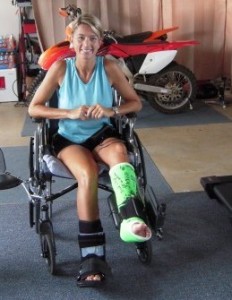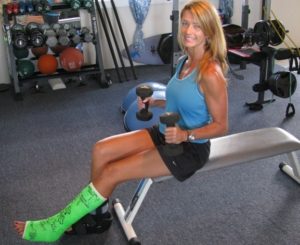How Exercise Can Help You Cope With Depression
MAUI, Hawaii

Depression, me? Yes. It’s easy to judge a book by it’s cover so at the risk being vulnerable, like many people I’ve had to manage challenging circumstances all throughout my life that have often left me in a funk or in a serious low emotional state and ultimately depressed. I am not ashamed to admit or share that I have experienced these very low times. During those periods I sometimes lost all desire to workout and exercise, surf or paddle, didn’t want to get out of bed, could barely eat, and many times often had to force a smile when I was deeply sad on the inside.
As an athlete, trainer and coach I’m here to shout to the world that exercise has not only helped me manage difficult, short and longer episodes of depression, but many of the athletes and clients I’ve counseled and trained all over the world as well for almost 20 years.
My desire in writing this article is to help as a resource for you or someone you may know to help better understand a little of the science as to how exercise may help deal with depression and provide you with a few simple ways to make you feel strong and good again. All throughout my career it has been my personal mission to help others recognize and cope with depression through my training and coaching. I am a living example of how important exercise can be to help one reduce the battle of depression and feeling low.
I am a proud advocate for mental health working with and supporting the organization Bring Change 2 Mind. I have shared in my book that my mother and entire family has been touched by various degrees of mental illness. I am humbled and empathetic to anyone who also has to personally cope or perhaps who may have a close friend or family member going through this right now.
Personally, I’ve felt the heaviness of depression dealing with multiple injuries, chronic illness and multiple surgery recoveries, in addition to the normal part of life’s heart wrenching personal hardships and losses. There have been many times throughout my life where everything stopped, the grieving never ended, and I lost the motivation and the desire to continue. I was not able to see the proverbial “light at the end of the tunnel”, and no I couldn’t just “snap out of it.” I couldn’t “just be happy or just smile.”
***Those statements by the way are the worst thing you can say to someone or ask of someone who may be experiencing a low time in their life. (Discover more below on the some of the best things to say to someone who may be experiencing depression.)
One of THE most difficult times for me was in 2009 when I broke both legs in 2 seconds flat, leaving me in a  wheelchair for almost 4 months. My career, my life and world came to a complete stop. Not only did I lose my physical strength in less than 2 weeks as I watched in horror as my legs atrophied, but also my mental strength. My once bright, enthusiastic spirit disappeared, eroded and shriveled to nothing. I would cry, sulk and sit for hours with a blank stare into nothingness. I would train my clients from my wheelchair and try to continue to support them and their goals with everything I had.
wheelchair for almost 4 months. My career, my life and world came to a complete stop. Not only did I lose my physical strength in less than 2 weeks as I watched in horror as my legs atrophied, but also my mental strength. My once bright, enthusiastic spirit disappeared, eroded and shriveled to nothing. I would cry, sulk and sit for hours with a blank stare into nothingness. I would train my clients from my wheelchair and try to continue to support them and their goals with everything I had.
 Luckily I knew that I needed to be that example of health to help my clients and community and not lose faith. I could do upper body workouts but trust me it was difficult to get the motivation. One bicep curl would turn into two, then five and before I knew it I’d be done with two sets. I told myself I have to do what I CAN do.
Luckily I knew that I needed to be that example of health to help my clients and community and not lose faith. I could do upper body workouts but trust me it was difficult to get the motivation. One bicep curl would turn into two, then five and before I knew it I’d be done with two sets. I told myself I have to do what I CAN do.
Another challenged layer in life I manage is the after affects of the ciguatera toxins that have left my nervous system completely shot. To this very day I deal with painful daily episodes that are debilitating but I always manage to go forward. ( See the full article feature below from Adventure Sports Network.)
Keep in mind, not everyone wakes up jumping to their feet ready to conquer the day, or ready to smash the next surf or paddling competition. If you only knew of the multi-layered struggles that many must face and how exercise is not always automatic just because they are a top-level athlete. Professional athletes most definitely have daily challenges just like you and me.
The word “depression” or the state of “being depressed” is NO longer a stigma and should be understood and embraced with compassion as something that we all may have to manage or help someone we love cope with.
Let’s begin. First, we need to recognize some of the symptoms of depression.
These are just a few examples: Lack of motivation, not wanting to train or workout, low self-esteem, lack of confidence, low energy, the loss of desire to enjoy family time, pets, friends or sports or hobbies is what some may experience. Perhaps difficulty getting out of bed or experiencing lack of sleep is common for some. Over eating or eating too little, which can lead to another host of food related behaviors can also occur. Sometimes it’s also easier to isolate oneself instead of socializing with others. At times I felt totally blah and flat inside, and nothing seemed to bring me up.
Next, it’s important to know that it doesn’t make you less of an athlete or person or husband or wife or friend if you think you may be dealing with a bout of depression. You must know you are okay and that there is a way to feeling better again. It’s literally a shift in brain chemicals that controls the levels of the feel-good hormone, often identified as serotonin. There is so much more to this topic as I am simply scratching the surface. (To get more information please consult with a professional.)
Simply stated, there are three scientific pathways or hypothesis of the human body that exercise can contribute naturally to reduce some levels of depression:
The endorphin, monoamine and the thermogenic scientific hypothesis:
- The endorphin hormones are released during exercise to produce an up-tick for positive mood elevation.
- The monoamine theory suggests that brain neurotransmitters create a brilliant and promising physiological path to increase the availability of the feel-good hormones to rush the body more quickly.
- And lastly, the thermogenic science suggests that when the core temperature of the body increases this may also help in reducing some of the symptoms of depression as certain regions of the brain’s temperature also increases, leading to the feelings of relaxation and reducing muscular tension.
SIMPLE EXERCISE TIPS TO HELP COPE AND REDUCE SOME OF THE SYMPTOMS OF DEPRESSION:

- Remove Barriers: Change the word “exercise”. If you are someone who has an adverse reaction just to the word “exercise” change it. Maybe call it “move time” or “me time” or ‘go time” or whatever you want so that you can set yourself up to start the movement process.
- What Kind of Exercise: Just move, get up and stand, move your arms in big circles. Go for a brisk walk, surf or paddle, wash the car, walk in a forest, rake leaves, clean out a shed or garden bed, play catch with your kid, walk the dog or the neighbor’s dog. It all counts.
- How Much: Start with 15-30 minutes a day because really that’s all your brain needs to start to make these small to magnificent changes in your brain chemically then to your body. Once you create this daily habit you will notice your steps become lighter and you’ll hopefully want to have that nice feeling again so you will continue and repeat and maybe increase your me time.
- Surround yourself with positive people and ask someone close to join you. Nothing is better than having a buddy or good friend perhaps who can hold your hand. You don’t have to talk, just be. It not only holds you to a simple commitment but who knows, you may be helping them too.
- The best thing you can do is hire a professional coach and trainer and have them in your corner who can really be there for you. I can help you re-gain your confidence, your mental and physical strength. It’s what I love to do.
I’m already so proud of you because you’ve made it this far to read my article if not for yourself but perhaps for someone you care about. Depression is not a four-letter word. These are difficult times in our lives and in our world and we must reach out and take responsibility for ourselves and for the ones we love.
Our mental health matters, your mental health matters and so does everyone’s mental health. It’s probably the biggest component to being physically healthy. Being a part of someone’s new found joy and witnessing so many professional athletes and clients transform their lives from some difficult lows back to a healthy state of life and well-being has been sincerely rewarding because I have walked in their shoes too.
In closing have the courage to recognize if you may need a little extra boost to elevate your mood. Please also reach our for professional help if you need. Or if someone you know is struggling, please ask the sometimes uncomfortable, hard questions about maybe feeling low or depressed. Know that what you can say to someone who is having a hard time can have a huge impact and hopefully help change or save their life. Learn how to communicate correctly and effectively and with a kind heart.
Here are two of my favorite links that may help to start the conversation:
Bring Change to Mind offers this helpful link “How to Talk About Mental Health to Anyone” https://bringchange2mind.org/learn/psas/talk-to-anyone
My favorite link: Tool Talk – How to Talk About Depression, Anxiety and more.
https://bringchange2mind.org/talk/talk-tool/
Being healthy in our minds and body is first a state of mind. My mantra continues to resonate with my athletes and clients and hopefully now you or someone you know and that is:
#themindwinsfirst
Our minds are precious and know that you will smile again. One step in front of the other, everyday even if you have to talk out loud to yourself. I do it all the time. You’re not alone.
While exercise can help sometimes there is a need for additional professional help. Please reach out to a friend or family member or to your physician or check out local support groups in your area. I hope now you can clearly see that by introducing exercise to help improve our mental and physical state in feeling good again and smiling again is possible.
There is no shame in taking that first step. I’m also here for you as part of your mental health and physical wellness team. If you’d like to explore training and coaching with me, I’ve been traveling the globe and am able to remotely train all over the world via SKYPE. It’s effective, fun and easy as long as you have a lap top and strong WIFI. Please feel free to contact me via this website.
Remember, if I can do it, you can do it!
Warmest Aloha,
Suzie Cooney
Maliko Run ®

References:

The Benefits of Exercise for the Clinically Depressed
Lynette L. Craft, Ph.D. and Frank M. Perna, Ed.D., Ph.D
For more inspiration, surfing, SUP, music, life and more: follow me on Instagram

OTHER RELATED ARTICLES YOU MAY ENJOY:



